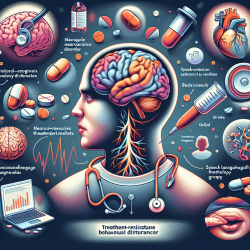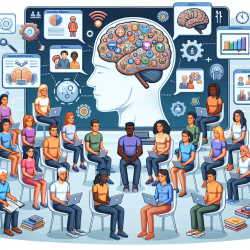Introduction
Stroke is a significant neurological disorder affecting millions globally each year. Beyond the immediate physical impacts, stroke survivors often face a myriad of neuropsychiatric sequelae, including major vascular neurocognitive disorders with behavioral disturbances. These disturbances can be particularly challenging to manage, especially when they prove resistant to conventional treatments. Recent research has highlighted the potential of Electroconvulsive Therapy (ECT) as a viable option for such cases.
Understanding ECT in the Context of Stroke
Electroconvulsive Therapy, or ECT, is a medical treatment that involves electrically induced seizures. Historically, ECT has been used to treat severe depression and other psychiatric disorders. However, its application in managing treatment-resistant behavioral disturbances post-stroke is gaining attention. The case study discussed in the research article Use of ECT in Major Vascular Neurocognitive Disorder with Treatment-Resistant Behavioral Disturbance following an Acute Stroke in a Young Patient provides compelling evidence of ECT's effectiveness.
Case Study Insights
The case involved a 47-year-old woman who, after suffering a stroke, exhibited severe behavioral disturbances that were resistant to various pharmacological treatments. Despite extensive medication trials, including antipsychotics and mood stabilizers, her symptoms persisted. ECT was considered a last resort, and the outcomes were promising.
- ECT led to significant improvements in her behavioral symptoms.
- The patient was able to transition from an inpatient psychiatric unit to a nursing home.
- The treatment was well-tolerated with minimal adverse effects.
This case suggests that ECT can be an effective intervention for managing treatment-resistant behavioral disturbances in stroke patients, particularly when other treatments have failed.
Implications for Practitioners
For practitioners in the field of speech-language pathology and related disciplines, these findings underscore the importance of considering all available treatment options. While ECT may not be the first-line treatment, it should be considered in cases where traditional therapies do not yield results. Practitioners should:
- Stay informed about the latest research and treatment modalities.
- Collaborate with a multidisciplinary team to assess the suitability of ECT for individual patients.
- Advocate for patient-centered care that considers the unique needs and circumstances of each individual.
Encouraging Further Research
The case study highlights a gap in the current research landscape: the lack of randomized controlled trials evaluating ECT's efficacy in treating behavioral disturbances in vascular dementia. Further research is needed to:
- Determine the long-term effects and safety of ECT in younger stroke patients.
- Explore the potential for ECT as a standard treatment option for similar cases.
- Develop guidelines for the use of ECT in neurocognitive disorders post-stroke.
By pursuing these research avenues, the medical community can better understand and utilize ECT, ultimately improving outcomes for stroke patients with challenging behavioral disturbances.
To read the original research paper, please follow this link: Use of ECT in Major Vascular Neurocognitive Disorder with Treatment-Resistant Behavioral Disturbance following an Acute Stroke in a Young Patient.










